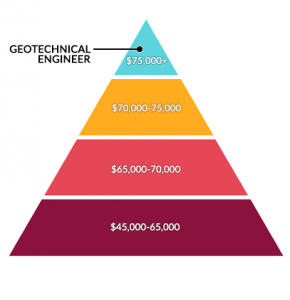Unknown Facts About Geotheta
Unknown Facts About Geotheta
Blog Article
The Greatest Guide To Geotheta
Table of ContentsGeotheta - TruthsThe Geotheta IdeasGeotheta for BeginnersThe 45-Second Trick For GeothetaThe Definitive Guide to Geotheta

They conduct site examinations, accumulate samples, carry out research laboratory examinations, and evaluate data to assess the suitability of the ground for building tasks - Consulting Engineers. Based upon their searchings for, geotechnical designers supply referrals for structure layout, incline security, preserving structures, and mitigation of geotechnical risks. They team up with various other specialists, such as architects, structural designers, and building and construction groups, to ensure that geotechnical considerations are incorporated into the general job style and execution
By analyzing the actions and homes of dirt and rock, they can recognize possible geotechnical threats such as landslides, soil settlement, or slope instability. Their experience aids protect against failures or accidents that could threaten lives and property. Below are some in-depth obligations and duties of a geotechnical engineer: Website Examination: Geotechnical designers conduct site investigations to collect data on subsurface conditions.
They analyze the information to recognize the properties and habits of the soil and rock, including their stamina, leaks in the structure, compaction attributes, and groundwater problems. Geotechnical Evaluation and Layout: Geotechnical designers analyze the information collected throughout site examinations to analyze the security and viability of the website for building projects. They carry out geotechnical calculations and modeling to evaluate variables such as birthing capability, settlement, incline stability, lateral earth stress, and groundwater circulation.
The smart Trick of Geotheta That Nobody is Discussing
Foundation Design: Geotechnical engineers play an important function in designing structures that can securely support the intended framework. They assess the dirt conditions and lots demands to determine the proper foundation kind, such as shallow foundations (e.g., footings), deep structures (e.g (https://sketchfab.com/geotheta)., heaps), or specialized techniques like dirt enhancement. They think about factors such as negotiation limitations, bearing capacity, and soil-structure interaction to develop optimal structure layouts
They review construction strategies, display site activities, and perform field evaluations to verify that the layout suggestions are complied with. If unforeseen geotechnical concerns occur, they assess the scenario and offer recommendations for removal or modifications to the style. Danger Assessment and Mitigation: Geotechnical designers analyze geotechnical hazards and threats connected with the job site, such as landslides, liquefaction, or dirt disintegration.

Partnership and Communication: Geotechnical designers work closely with other experts involved in a task, such as engineers, structural engineers, and construction teams. Efficient interaction and cooperation are important to incorporate geotechnical factors to consider into the total task design and building process. Geotechnical designers supply technical competence, solution inquiries, and ensure that geotechnical requirements are fulfilled.
The 6-Minute Rule for Geotheta
Here are some sorts of geotechnical designers: Foundation Engineer: Structure engineers specialize in making and analyzing foundations for structures. They assess the soil conditions, load requirements, and website attributes to establish one of the most ideal structure kind and layout, such as superficial structures, deep foundations, or specialized techniques like heap structures.
They assess the factors influencing incline stability, such as dirt buildings, groundwater problems, and incline geometry, and create techniques to stop slope failures and reduce dangers. Quake Engineer: Earthquake designers specialize in examining and developing structures to stand up to seismic pressures. They evaluate the seismic danger of a site, examine dirt liquefaction potential, and create seismic style standards to guarantee the security and strength of frameworks throughout quakes.
They do field testing, collect examples, and examine the gathered data to identify the dirt residential properties, geologic developments, and groundwater conditions at a site. Geotechnical Instrumentation Designer: Geotechnical instrumentation designers concentrate on surveillance and measuring the actions of soil, rock, and frameworks. They set up and maintain instrumentation systems that keep an eye on factors such as soil settlement, groundwater degrees, incline movements, and architectural displacements to assess performance and give early warnings of prospective issues.
Geotheta for Beginners
They conduct examinations such as triaxial tests, debt consolidation examinations, click site straight shear tests, and leaks in the structure tests to collect information for geotechnical analysis and style. Geosynthetics Designer: Geosynthetics designers focus on the design and application of geosynthetic products, such as geotextiles, geogrids, and geomembranes. They use these products to boost dirt stability, strengthen inclines, give drainage options, and control disintegration.
They have a tendency to be investigative individuals, which suggests they're intellectual, introspective, and investigative. They are interested, systematic, reasonable, analytical, and logical. Some of them are additionally social, meaning they're kind, charitable, participating, person, caring, helpful, empathetic, tactful, and pleasant - Consulting Engineer.
In the office setting, geotechnical designers use specialized software application tools to perform calculations, develop styles, and evaluate data. They prepare reports, testimonial task specifications, communicate with clients and team participants, and coordinate project activities. The workplace setting provides a helpful environment for study, evaluation, and partnership with other specialists associated with the task.
Some Of Geotheta
They regularly go to task sites to perform site examinations, analyze geotechnical conditions, and collect data for evaluation. These sees involve traveling to various locations, in some cases in remote or challenging terrains. Geotechnical engineers might perform dirt sampling, conduct tests, and monitor construction activities to make certain that the geotechnical elements of the job are being executed appropriately.
Geotechnical engineers additionally work in specialized geotechnical research laboratories. In these facilities, they perform experiments, perform tests on dirt and rock examples, and analyze the engineering homes of the materials. Geotechnical lab engineers work extensively in these atmospheres, taking care of testing devices, operating instruments, and tape-recording information. They collaborate with other laboratory staff to make sure exact and trustworthy screening results.
Report this page